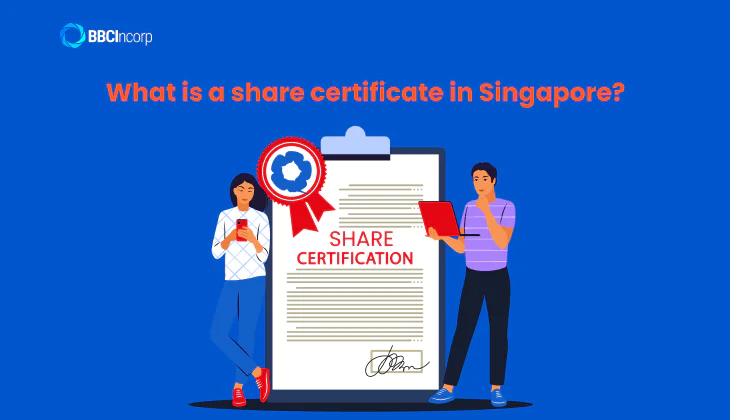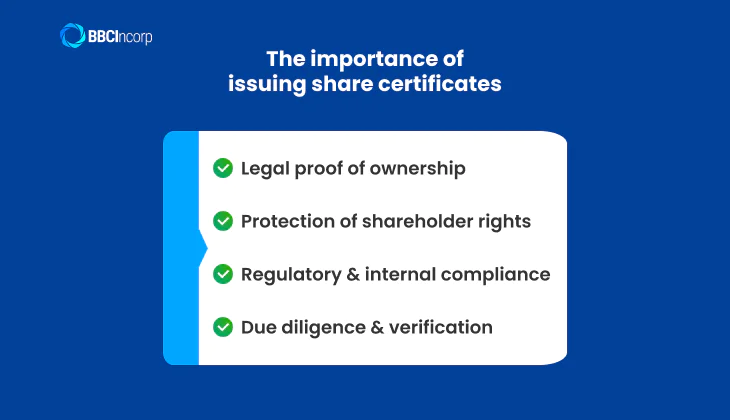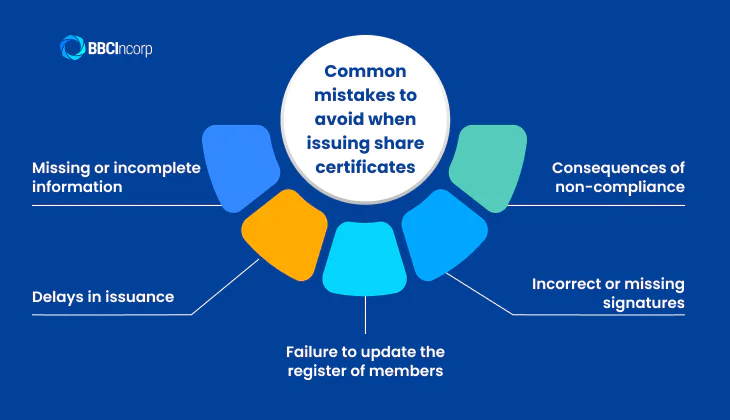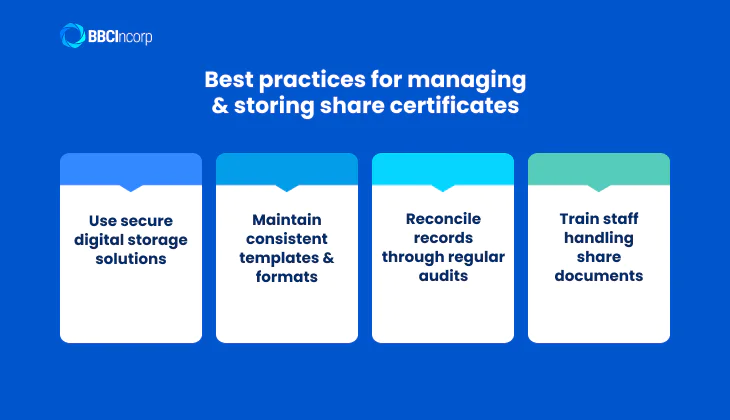
- What is a share certificate in Singapore?
- When and why do companies issue share certificates?
- How to create a share certificate in Singapore?
- Common mistakes to avoid when issuing share certificates
- Key differences between share certificates and other shareholder documents
- Best practices for managing and storing share certificates
- Reliable support from BBCIncorp for your Singapore share certificate needs
- Conclusion
Behind every well-structured company in Singapore is a clear record of ownership, and at the core of that record is the share certificate. This document is more than just a formality.
A Singapore share certificate serves as legal proof of a shareholder’s ownership, establishes a transparent shareholding structure, and reinforces strong corporate governance.
Under the Companies Act 1967, companies must issue share certificates within 60 days of incorporation, or 30 days after allotting or transferring shares. In this article, we explain what a share certificate is, its legal basis in Singapore, the issuance process, common errors to avoid, and best practices every company should follow.
What is a share certificate in Singapore?
A share certificate may seem like a simple document, but in Singapore’s corporate landscape, it plays a vital role in establishing legal ownership and ensuring transparency in company records.
Definition and legal proof of ownership
A share certificate is a formal document issued by a company to confirm that an individual or entity is the registered owner of a specific number of shares. While it does not represent the shares themselves, it acts as strong legal proof of share ownership and is an essential part of company records.
Under Singapore law, a share certificate carries significant legal standing. Although it is not conclusive proof of title, it serves as prima facie evidence of ownership and can support a shareholder’s rights in legal or financial matters. This makes it especially valuable in corporate transactions and dispute resolution.

Function in the corporate structure
In the context of corporate governance, a Singapore share certificate fosters transparency in the shareholding structure. It allows companies to accurately track ownership changes and makes sure that share allotments and transfers are properly recorded.
This strengthens legal clarity and promotes trust among shareholders, directors, and external parties such as auditors and investors..
Standard share certificate format
To comply with legal and practical standards, a Singapore share certificate must include specific details. These typically are:
- The full name of the company
- The name and identification of the shareholder
- The number and class of shares issued
- The date of issue
- The company’s official seal or an authorised electronic signature
This format helps maintain consistency in company records and simplifies the verification process during due diligence or fundraising.
Why it matters
Comprehending the share certificate meaning is important for directors, shareholders, and investors. Whether managing capital contributions, planning ownership changes, or preparing for external funding, properly issued share certificates provide legal assurance and support long-term business credibility.
In the next section, we will guide you through when and why to issue a Singapore share certificate, covering the timing and purposes of issuance.
When and why do companies issue share certificates?
A share certificate is issued whenever there is a change or confirmation in the shareholding structure of a company. In Singapore, this is a formal requirement under the Companies Act and a key part of maintaining accurate and compliant company records.
Events that trigger issuance
Several corporate actions require a company to issue or create a share certificate, including:
- Incorporation and initial share allotment: When a company is first set up, shares are allotted to its founders or early investors. A share allotment certificate must be issued to document these holdings.
- Issuance of new shares: When new capital is raised or additional investors come on board, new share certificates are issued to reflect the updated ownership.
- Share transfer or transmission: When shares change hands through sale, inheritance, or gifting, the company must cancel the previous certificate and issue a new one to the new shareholder.
- Share buyback or corporate restructuring: Any transaction that affects the number or distribution of shares, such as a buyback or conversion, requires the company to update its shareholder documentation accordingly.
Purpose and importance
A Singapore company must issue share certificates not only to fulfil legal obligations but also to ensure transparency and operational efficiency. These documents play several critical roles:
Legal proof of ownership
Share certificates offer strong evidence that a person or entity holds shares in the company, which is essential during legal or financial reviews.
Protection of shareholder rights
Having a valid certificate lets shareholders exercise their rights, such as voting or receiving dividends, and reduces the risk of disputes.
Regulatory and internal compliance
The Companies Act requires proper record-keeping, and issuing timely certificates helps companies remain compliant and avoid penalties.
Due diligence and verification
Banks, investors, and auditors often request share certificates during financing rounds, mergers, or compliance checks to verify ownership and capital structure.
Next, we will walk through the steps to issue a share certificate in Singapore, including format requirements and signature authorisation.

How to create a share certificate in Singapore?
Creating a share certificate in Singapore requires careful attention to both legal obligations and company procedures. This process confirms valid shareholding and keeps statutory records up to date in accordance with the Companies Act.
Preparation steps
Before issuing a certificate, the company must first pass a board resolution to approve the share allotment or transfer. This decision authorises the update of the company’s electronic register of members, which records the shareholders’ details and the number of shares held.
Once the resolution is passed and the register updated, the company can proceed to draft the certificate. The format must meet share certificate requirements under Singapore law. Each certificate should clearly state:
- The company’s full name
- The shareholder’s full name and identification or passport number
- The number and class of shares issued
- The date of issuance
- The signatures of two directors, or one director and the company secretary
Issuance procedures
To issue the certificate, it must be signed by authorised officers. This means two directors, or one director and the company secretary. If the company constitution requires a common seal, it should be affixed; otherwise, the seal is optional. Many companies now adopt digital signing, especially when working with online platforms that support secure corporate filings.
Electronic vs. physical certificates
Singapore recognises digital share certificates as legally valid under the Electronic Transactions Act, provided they are securely signed and stored. These are commonly used by private limited companies that manage records electronically.
Digital certificates offer several practical benefits:
- Faster issuance and delivery
- Easy retrieval and secure cloud storage
- Simplified verification during due diligence or audits
Accepted formats include secured PDFs with embedded electronic signatures and audit trails. These documents are frequently accepted by banks, auditors, and investors for compliance checks and capital-raising activities.
Knowing how to create share certificates and issue them correctly in Singapore helps companies stay compliant while improving operational efficiency. In the following section, we will highlight common errors to avoid when issuing share certificates and how to manage them effectively.
Common mistakes to avoid when issuing share certificates
Issuing a share certificate is a formal legal process in Singapore that requires accuracy and attention. Mistakes in documentation or procedure can lead to compliance breaches, shareholder disputes, and reputational risks during audits or fundraising.

Missing or incomplete information
A frequent error is omitting key details. Every share certificate must include the shareholder’s full name, identification number, number and class of shares, issue date, and the proper authorisation. Leaving out any of these elements reduces the legal clarity of the certificate and may cause issues in future transactions.
Delays in issuance
The issuance of share certificates in Singapore is governed by the Companies Act (Cap. 50). Under Section 126, companies must issue share certificates within 60 days after formation, and 30 days after the allotment or transfer of shares.
Delays beyond this timeline may result in financial penalties for both the company and its officers. Timely issuance is a legal obligation and supports transparent record keeping.
Failure to update the register of members
The register of members is the authoritative record of a company’s shareholding structure. If it is not updated after a share certificate is issued, inconsistencies may arise. This can create problems during audits, corporate restructuring, or any situation where proof of ownership is needed.
Incorrect or missing signatures
Each certificate must be signed by two directors or by one director and the company secretary. Missing or unauthorised signatures may render the certificate invalid. This can delay share transfers, regulatory filings, or investment rounds where accurate documentation is required.
Consequences of non-compliance
Failure to follow share certificate compliance rules can trigger penalties under the Companies Act. Incomplete or delayed issuance may also lead to shareholder disputes if ownership is contested.
During due diligence or fundraising, any inconsistency in shareholder records may raise concerns for auditors, investors, and banks. This could affect deal timelines, reduce confidence, or require additional corrective work. Poor share certificate management also leads to unnecessary complications in annual filings and corporate secretarial reviews.
Key differences between share certificates and other shareholder documents
In managing corporate records, it is important to distinguish between a share certificate and other related documents. Each serves a different function in confirming, recording, or summarising shareholding information.
Share certificate vs. share register
The share register, also known as the register of members, is the official record that lists all shareholders of a company and the number of shares they hold. This document is maintained internally and must be updated with every change in shareholding.
In contrast, a share certificate is issued to each individual shareholder as legal proof of ownership. While the register establishes legal ownership in Singapore, the certificate supports this claim and is often used as evidence in transactions.
Share certificate vs. shareholding statement
A shareholding statement is usually a summary document, often generated for informational purposes. It outlines the number of shares held by a person at a given point but does not carry the same legal weight as a share certificate.
Share certificates are governed by the Companies Act and must be signed and issued according to statutory requirements. Shareholding statements are not regulated and may not be accepted as legal proof in formal settings.
Certified or notarised copies
In some cases, a company or shareholder may need to provide a certified true copy or notarised version of a share certificate. This often arises during cross-border transactions, foreign bank account openings, or when dealing with overseas regulatory bodies. Notarisation confirms that the copy is authentic and matches the original.
Understanding the differences between these documents ensures proper handling of shareholder records. No matter reviewing the shareholder register in Singapore or preparing a certified share certificate copy, clear documentation builds trust and supports smooth business operations.
Best practices for managing and storing share certificates
Proper management of share certificates supports good corporate governance and ensures compliance with Singapore regulations. Whether your company issues physical or digital certificates, consistent handling reduces legal risk and protects shareholder interests.

Use secure digital storage solutions
For companies issuing electronic share certificates, using encrypted cloud-based platforms helps store share certificate records safely. Many firms in Singapore adopt corporate management software that supports secure access, version tracking, and digital signing. This approach improves accessibility and simplifies internal reviews and external audits.
Maintain consistent templates and formats
Applying a standard format to all share certificates improves clarity and reduces errors. Include required fields such as the shareholder’s name, identification, number and class of shares, date of issue, and authorised signatures. Consistency in structure also supports faster verification by auditors or potential investors.
Reconcile records through regular audits
Performing periodic internal audits ensures that the register of members aligns with the issued share certificates. This process helps identify any discrepancies early and reduces the risk of compliance issues during formal reviews. Accurate reconciliation is especially important before key events such as fundraising, mergers, or share transfers.
Train staff handling share documents
Administrative teams involved in issuing or reissuing share certificates should understand the legal requirements under the Companies Act and the company’s internal procedures. Regular training will prevent errors in documentation, reduce turnaround time, and improve overall share certificate management.
Following these best practices for managing and storing share certificates will let companies in Singapore meet compliance standards and build trust with stakeholders.
Reliable support from BBCIncorp for your Singapore share certificate needs
Accurate and timely issuance of share certificates is critical to meeting regulatory standards in Singapore. And BBCIncorp’s company secretary services deliver clear, compliant solutions so you can manage this responsibility with confidence.
As a trusted corporate service provider, BBCIncorp handles the drafting, issuance, and ongoing compliance of both physical and digital share certificates. Each certificate is prepared in line with the Companies Act, including all required details such as shareholder name, number of shares, share class, and authorised signatures.
Our team ensures that your shareholder records stay accurate and up to date. We help prevent common mistakes, reduce the risk of penalties, and support your compliance efforts at every stage of the business cycle.
Visit our site for more about our services, from Singapore company incorporation to compliance needs and how we support your business today.
Conclusion
The Singapore share certificate plays a vital role in confirming legal share ownership and supporting effective corporate governance.
Issuing certificates accurately and on time is not just a regulatory requirement under the Companies Act but also a safeguard for shareholder rights and business credibility. Errors or delays can lead to compliance issues, disputes, and audit complications.
By maintaining clear records and following best practices in managing share certificates, companies can strengthen their internal processes and reduce risks. For professional support, don’t hesitate to contact BBCIncorp team at service@bbcincorp.com for timely assistance.
Frequently Asked Questions
Does the new company need to issue a share certificate in Singapore?
Yes. Every newly incorporated company in Singapore is required to issue share certificates to its shareholders after the allotment of shares.
This document serves as legal proof of ownership and is a statutory requirement under the Companies Act (Cap. 50). Companies must issue share certificates within 60 days of share allotment and 30 days of a share transfer being lodged.
Timely issuance is not just a legal obligation but also supports accurate shareholder records and strengthens corporate governance. Delays or errors can, and will lead to penalties, complicate audits, and unnecessary disputes.
What to do if you lose your share certificate?
If a share certificate is lost, the shareholder should report it to the company promptly in writing. The company may ask for a formal request, identification documents, and details such as the number of shares and certificate number.
In addition, the shareholder may need to provide an indemnity declaration and publish a notice in a local newspaper to prevent potential misuse. The board will assess the application and, if complete and accurate, approve the issuance of a replacement certificate.
Keeping share certificates in a secure location or using electronic records where applicable reduces the risk of loss and protects the company’s official ownership records.
Disclaimer: While BBCIncorp strives to make the information on this website as timely and accurate as possible, the information itself is for reference purposes only. You should not substitute the information provided in this article for competent legal advice. Feel free to contact BBCIncorp’s customer services for advice on your specific cases.
- What is a share certificate in Singapore?
- When and why do companies issue share certificates?
- How to create a share certificate in Singapore?
- Common mistakes to avoid when issuing share certificates
- Key differences between share certificates and other shareholder documents
- Best practices for managing and storing share certificates
- Reliable support from BBCIncorp for your Singapore share certificate needs
- Conclusion
Industry News & Insights
Get helpful tips and info from our newsletter!
Stay in the know and be empowered with our strategic how-tos, resources, and guidelines.





